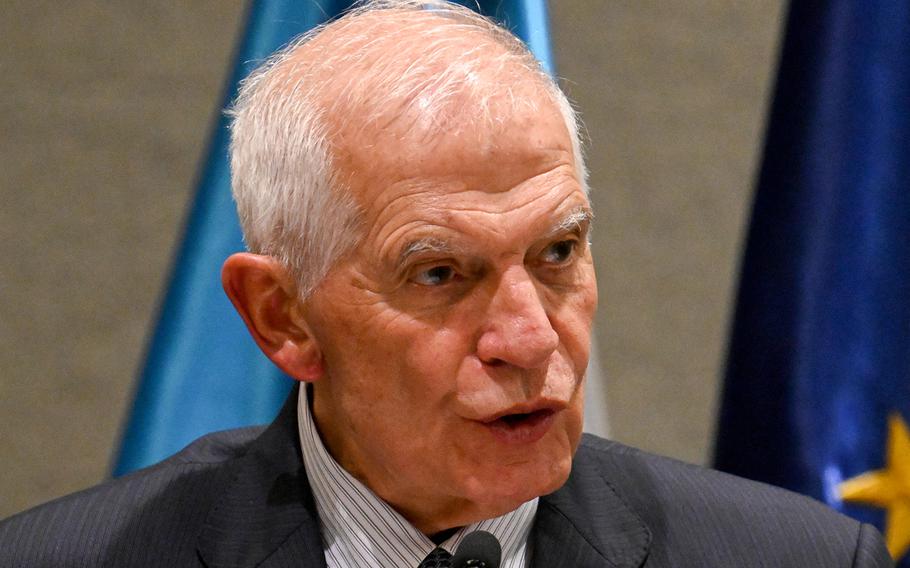Europe
EU nations fume over Hungary’s vetoes of Ukraine weapons aid
Bloomberg News May 27, 2024

European Union High Representative for Foreign Affairs and Security Policy Josep Borrell during a news conference in Guatemala City on Jan. 13, 2024. (Johan Ordonez, AFP via Getty Images/TNS)
(Tribune News Service) — European Union member states are growing increasingly exasperated by Hungary’s stonewalling of more than $7.1 billion of urgently needed military aid for Ukraine as its military struggles to fend off Russian assaults.
Budapest’s intransigence is prompting discussions among diplomats about how the EU fund could be shielded from Hungary’s veto when it soon receives another influx of cash from the profits of immobilized Russian assets.
“I have seven legal texts pending approval to mobilize resources to support militarily Ukraine,” EU foreign policy chief Josep Borrell said in a news conference Monday afternoon when asked about Hungary. “This delay can be measured in terms of human lives.”
Hungarian Foreign Minister Peter Szijjarto told reporters earlier Monday that his country is continuing to block all funding for Ukrainian weapons despite strong objections from other EU foreign ministers at a meeting in Brussels.
“This caused a huge uproar,” Szijjarto said, adding that Hungary faced “huge pressure” to yield. He said his colleagues yelled and spoke out of turn at the meeting.
As long as Hungary continues to block the disbursement of funding for military weapons donated to Ukraine, the bloc can’t use the money to help Kyiv despite a political agreement among all 27 countries back in March to enlarge the fund with billions in additional financing.
“We cannot accept a blockade of military aid. Agreements are made to be respected,” Belgian Foreign Minister Hadja Lahbib said on social media platform X. Belgium currently holds the EU’s rotating presidency until July, when Hungary takes over.
Hungary is blocking three separate €500 million tranches of funding from the European Peace Facility destined to help Ukraine.
In addition, EU member states in March had agreed to add 5 billion euros for 2024 to a weapons fund for Ukraine in an effort to reform the vehicle and ensure a steadier supply of support to Kyiv. The newly dubbed Ukraine Assistance Fund aims to meet Kyiv’s most urgent needs for artillery, specialized munitions, drones and air defense, as well as in non-lethal areas such as demining.
Ukrainian President Volodymyr Zelenskyy visited Spain on Monday as continues to press his European allies to provide more military equipment. He’s scheduled to visit Portugal on Tuesday.
Budapest’s blocks are prompting even greater anxiety as the EU fund is due to receive as much as billion in euro cash in July from the profits of frozen Russian assets. That money, which would be used directly instead of reimbursing member states, is due to finance the purchase of weapons for Ukraine.
Discussions are underway to try to insulate that money from Hungary’s vetoes and get it to Ukraine more quickly, according to a senior EU diplomat involved in the talks, who spoke on condition of anonymity.
In a meeting of EU ambassadors last week, Hungary said it couldn’t back the fund’s disbursements due to concerns about negative discrimination toward Hungarian companies in Ukraine, according to people familiar with the discussions.
Greece and Cyprus also continue to press for limits to purchases abroad despite the March agreement specifying that non-EU weapons could be purchased through the fund, according to diplomats familiar with the discussions. Still, Hungary is alone in outright blocking the fund.
“We have to be transparent as to what Hungary’s position currently is and has been,” Lithuanian Foreign Minister Gabrielius Landsbergis told reporters ahead of Monday’s meeting, adding that by his count 41% of EU files on Ukraine have been blocked by Hungary.
Szijjarto said that Hungary is also opposed to a possible 14th sanctions package on Russia, as well as even opening a debate on a proposal to allow Western nationals to train Ukrainian soldiers in Ukraine.
“They keep coming up with crazier and crazier ideas and a majority of countries can’t be convinced otherwise,” Szijjarto said.
A proposal to start accession talks with Ukraine is due to be discussed by EU ambassadors as soon as this week, with diplomats expecting further friction from Hungary.
“Almost all of our discussions and needed solutions and decisions by the EU are being blocked by just one country,” Landsbergis said. “It has gone very, very far.”
With assistance from Alberto Nardelli and Megan Howard.
©2024 Bloomberg L.P.
Visit bloomberg.com.
Distributed by Tribune Content Agency, LLC.